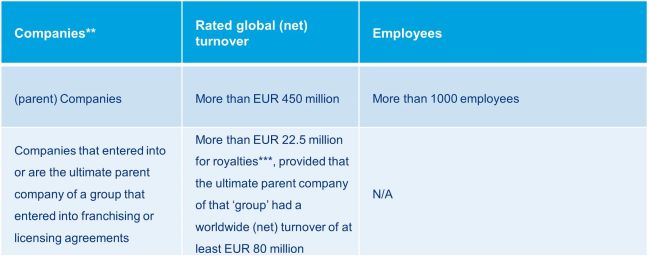- within Corporate/Commercial Law topic(s)
- within Corporate/Commercial Law topic(s)
- in United States
- with readers working within the Banking & Credit, Chemicals and Oil & Gas industries
- within Antitrust/Competition Law, Consumer Protection, Food, Drugs, Healthcare and Life Sciences topic(s)
The European Council has reached an agreement on the corporate sustainable due diligence directive (CSDDD). For a moment, it seemed that the CSDDD was off the table due to the decision of Germany to abstain from voting in favour of the CSDDD and the last-minute proposal from France regarding the threshold of in-scope companies. However, the Belgian presidency of the European Council circulated an adjusted proposal for the CSDDD as a last attempt to reach an agreement across the Member States and 'save' the CSDDD, and with success: the required (qualified) majority has been reached within the European Council today on 15 March 2024.
The pathway of the adjusted CSDDD
On 14 December 2023, the European Parliament and the European Council reached a provisional agreement on the CSDDD (please see our previous blog). After extensive negotiations between the European institutions and EU member states, a (qualified) majority within the European Parliament has approved the final text of the CSDDD (published on 30 January 2024). This final version of the CSDDD was submitted to the European Council for agreement on 28 February 2024. In first instance, no (qualified) majority was reached within the European Council, due to the decision of Germany to abstain from voting and the last-minute proposal from France regarding the threshold of in-scope companies (please see our previous blog). However, as a final attempt to meet concerns of Member States and to put new legislation through before the end of the current parliamentary term, the Belgian government circulated an adjusted proposal of the CSDDD. Today, on 15 March 2024, the European Council agreed on this adjusted proposal of the CSDDD.
Subsequently, the European Parliament's Committee on Legal Affairs (JURI) will vote on the final text of the CSDDD, after which the CSDDD will be send to the plenary session of the European Parliament in April 2024 to vote on the CSDDD. The European Commission will follow a similar timetable for the formalisation of the CSDDD.
General scope of the CSDDD
The scope* of the CSDDD is determined as follows (subject to the final approval of the JURI and European Parliament on the final text of the CSDDD):

* Please note that we have included the above summary of the criteria and thresholds following from the CSDDD for the overview. It is not conclusive and no rights can be derived from it. For more information on what the impact of the CSDDD entails for your organisation, feel free to contact the undersigned.
**Please note that the CSDDD both applies to companies which are formed in accordance with the legislation of an EU member state as well as companies which are formed in accordance with the legislation of a third country, provided that the company in question meets the criteria set out in the CSDDD.
***Provided that these franchise/ license agreements ensure a common identity, a common business concept and the application of uniform business methods.
Fewer in-scope companies under the CSDDD and adoption plan for in-scope companies
The threshold for in-scope companies has increased compared to the previous proposal of the CSDDD. As a result, less EU and non-EU companies fall within the scope of the CSDDD. Furthermore, the "high-risk" sector approach, as set out in the previous proposal of the CSDDD, is deleted. The rule that companies from certain "high-risk" sectors fall in scope of the CSDDD, if they would have a global net turnover of more than EUR 40 million, with at least EUR 20 million generated in these "high-risk" sectors, and more than 250 employees, will no longer apply. However, the adjusted CSDDD does include a review clause, offering the possibility to address this "high-risk" approach at a later stage.
The adjusted CSDDD also includes an adaption scheme for in-scope companies (which applies from the moment the CSDDD entries into force), which is as follows:
- Companies with more than 5000 employees and 1500 million turnover will have 3 years to comply with the CSDDD;
- Companies with more than 3000 employees and 900 million turnover will have 4 years to comply with the CSDDD;
- Companies with more than 1000 employees and 300 million turnover will have 5 years to comply with the CSDDD.
Obligations under the CSDDD to adopt transitions plans in line with the Paris Agreement
In-scope companies will be obliged on the basis of article 15 of the CSDDD to adopt a transition plan in accordance with article 19a CSRD, aimed at restricting global warming to a maximum of 1.5°C in accordance with the Paris Agreement. Furthermore, in-scope companies are required to put into effect a transition plan for climate change mitigation which aims a plan to ensure, through best efforts, that the business model and strategy of the company are compatible with the transition to a sustainable economy in line with the Paris Agreement. However, in the adjusted CSDDD, the obligation for in-scope companies above a certain threshold (more than 1000 employees) to implement a policy to promote the implementation of the plan through, inter alia, financial incentives, has been deleted.
Financial sector
The financial sector still seems to be in-scope, albeit for now only to a limited extent. The financial sector will only have to apply the CSDDD in relation to their own operations and upstream supply chains. Firms in the financial sector will also have to adopt a plan ensuring their business model complies with the Paris Agreement. There will be a review clause for a possible future expansion of the scope for this sector based on a sufficient impact assessment by the European Commission.
Obligations under the CSDDD for supply chains of in-scope companies
The previous proposal of the CSDDD stated that if an in-scope company identified actual and/or potential adverse impacts on human rights and/or on the environment (CSDDD risks) within its value chain which cannot be prevented or ended, such in-scope company should terminate its partnerships with companies responsible for such adverse impacts. Under the adjusted CSDDD, however, such termination will be a last resort, where the in-scope company itself would set an appropriate timeframe in its preventive or corrective action plan, and where termination is assessed against whether it would result in manifestly more serious adverse impacts.
Such companies thus will be required to implement a 'CSDDD-proof' risk management system on the basis of articles 4 and 5 of the CSDDD (article 4a of the CSDDD provides for due diligence support at a group level under the CSDDD), to actually be able to identify and assess actual or potential adverse impacts in accordance with article 6 of the CSDDD and, where necessary, prioritising potential and actual adverse impacts in accordance with article 6a of the CSDDD in case it is not feasible to prevent or mitigate such directly for the in-scope company.
The CSDDD contains a risk-based approach. Therefore, an in-scope company only has the obligation to take measures (in line with articles 7 and 8 of the CSDDD) if it is directly responsible for the CSDDD-risks. Otherwise, the responsibility extends to a general duty of care of the in-scope company. The duty of care of directors of in-scope companies is excluded from the CSDDD. However, EU member states have discretionary authority to include such duty of care in their national implementation of the CSDDD.
Under the adjusted CSDDD EU member states will have to ensure that in-scope companies take appropriate measures to carry out effective engagement with stakeholders, in accordance with article 8d of the CSDDD, as part of the due diligence process under the CSDDD.
Control mechanism of the CSDDD and the scope of (civil) liability
The CSDDD provides for two system of control. First, an administrative supervision and sanctions, including naming and shaming and heavy fines (maximum penalty of at least 5% of (net) worldwide turnover according to article 20 of the CSDDD). Second, the CSDDD includes strong possibilities for civil enforcement, as in-scope companies will be liable for damages caused by a breach of their obligations under the CSDDD (article 22 of the CSDDD).
The main conditions for establishing civil liability have not been changed, in comparison to the previous proposal of the CSDDD: an in-scope company can be held liable for damages caused to a natural or legal person, provided that the in-scope company intentionally or negligently failed to comply with the obligations under the CSDDD, and as a result of such failure to comply, damages to the natural or legal person's legal interest protected under national law was caused. Nevertheless, an in-scope company cannot be held liable if the damage was caused only by its business partners in its chain of activities.
Also, EU member states must still provide for reasonable conditions allowing an alleged injured party to authorize a trade union or NGO, and according to national law, national human rights' institution, to bring forward actions to enforce the rights of the alleged injured party. The CSDDD no longer explicitly mentions that such organization or institution should be able to do so 'in its own capacity'. This allows the EU member states more flexibility and does not require the EU member states to extend their national provision on representative actions as defined in Directive 2020/1828 (the Representative Actions Directive (RAD) – please see our earlier blog in this regard).
Dutch law already provides a well-established statutory regime for class actions and collective redress (please see our earlier blog in this regard). This possibility might make the Netherlands an appealing jurisdiction to bring such civil claims on violation of CSDDD to court.
The content of this article is intended to provide a general guide to the subject matter. Specialist advice should be sought about your specific circumstances.







